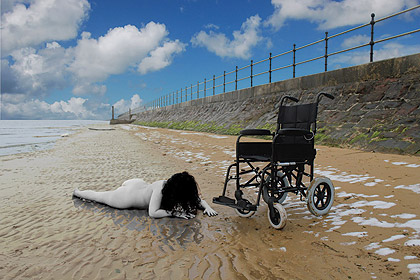
| HOME |
| NERVE |
| REVIEWS |
| ARCHIVE |
| EVENTS |
| LINKS |
| ABOUT US |
| CONTRIBUTORS |
| BACK ISSUES |
| CONTACT US |
Back to index of Nerve 19 - Winter 2011
 The
Broken of Britain:
The
Broken of Britain:
Fighting back in the war on the disabled
Interview with disability campaigner Kaliya Franklin
By Leila Davey
It has been a busy year for local disability rights campaigner Kaliya Franklin. She has gone from a life managing Ehlers-Danlos syndrome (a disorder which causes spontaneous joint dislocation), to disability campaigner extraordinaire in a matter of months.
As one of the co-founders of disability rights organisation The Broken of Britain – a word play on the Conservatives’ hyperbolic notion of a ‘Broken Britain’ – she has tenaciously led a campaign against the government’s controversial reforms to disability benefits.
The attack on disability benefits by the coalition - who aim to slash 20% from Disability Living Allowance (DLA) and £2.5bn from Employment Support Allowance (ESA) - has led to widespread criticism by disability charities and campaigners as a nefarious and ideologically driven attack on the vulnerable. Founded as a response to these cuts, The Broken of Britain was developed by Kaliya and fellow activist Rhydian Fôn James solely as an Internet campaign and has since amassed a large following.
I go to interview her at the campaign headquarters - the kitchen of her flat in Wirral - and as she sips a cup of tea, she recalls how it began. “With Cameron, it was the announcement that they were going to remove mobility from care home residents,” she explains. “Increasingly furious, I made this video letter to Cameron that ended up on the Guardian website and it went from there.”
Since those early days of the campaign, it has gone on to empower people for whom, due to ill health, traditional activism is not an option. Acknowledging this, she continues, “If we didn’t have social media and the Internet this wouldn’t be happening. As in the 90s when Blair tried to do this, a small handful of activists would have rocked up at Parliament and chained themselves to something. The vast majority of disabled people and carers can’t do that.”
She continues, “We have given a voice to people who the rest of the world doesn’t know exist. Because you don’t see disabled people that much it’s easy to get the impression that there aren’t that many of us, whereas there’s more than 10 million people with a disability or illness of some kind in the UK. Online campaigning changed everything. I think social media is as revolutionary as the printing press was, for ordinary people.”
ATOS, the company hired to carry out the work capability assessments whose head office is based in Liverpool, have come under increasing criticism since the new work capability assessment was initiated. They have been accused of deliberately declaring unwell people fit to work in order to meet Department for Work and Pensions targets. This argument is supported by the fact that 70% of those who appeal with legal assistance go on to win at tribunal.
Kaliya agrees, “We’ve just found the contract between the DWP and ATOS and it appears that targets have been written into the contract by the DWP.” She continues, “I fear that the more people protest against ATOS, the more we’re doing the government’s dirty work for them. You know, every time a handful of disabled people picket ATOS well, ATOS don’t care. But if those same people were sitting outside DWP offices, it targets the blame in the right place and that would be much much more difficult for the government to deal with.”
She continues, “ATOS also do occupational health medicals for big companies. But they’re not assessed on the same criteria. So there’s been plenty of cases of people being medically retired via the ATOS occupational health department, then denied benefits because they’re fit to work by the ATOS benefit department,” she laughs. “But at the end of the day ATOS don’t make the final decision as to whether you get benefits: that’s done by a decision-maker at the DWP.”
As the next reading of the bill approaches there has been a significant development as the Department for Work and Pensions have come under the spotlight for massaging statistics. This August, they admitted that one of the primary statistics that they had used to justify cuts “showed a distorted picture”. Their assertion that the DLA caseload had increased by 30% over the last eight years was shown to be inflated - a figure that was challenged by The Broken of Britain at the time. I ask Kaliya about this and she sighs, “The fact that not only did they not do any research that they’re basing these assumptions on, but then they only did it when challenged and at a very basic level. It turns out that there is absolutely no evidence for their claims and they sat on it while the bill was still active in the Commons. I’m not sure what the political and legal consequences of that are.”
She continues, outlining their plans for the future, “Challenging the Welfare Reform Bill is our priority. We can’t look at the wider context of disability rights as a civil rights issue, not because we don’t want to but because we’re volunteers who are all running on empty. At the moment our priority is going to be challenging the DWP about their dodgy use of statistics.” She concludes with, “We are looking at Boys from the Black Stuff, the only thing that’s changed is the scenery...”
To find out more about the campaign go to www.brokenofbritain.org